By Erin Inclan, Communications Director, Amplio
“Communication is really the first and most important thing to think about when a health crisis emerges.” — Dena Morris, former president and CEO, Washington Global Health Alliance

Photo credit: UNICEF Ghana. Community health nurses played Talking Book message during antenatal clinics.
How do you reach and communicate with people with low- or zero-literacy skills who live in last-mile communities where there’s no infrastructure, electricity, or internet? How do you get your message across if they only speak a local language? This is a challenge under normal circumstances, but what happens in a pandemic?
Since 2007, Amplio has been providing an inclusive digital solution for sharing knowledge with low-literate people in rural, remote communities. Early on, our Talking Book audio device was field-tested in schools in Ghana. More often learning takes place outdoors—ideally, under a tree for shade. Today, our partners use Talking Books to address cross-cutting issues and sectors, including agriculture, health, and gender. With the Talking Book, they can deliver hours of targeted content in a community’s local language, with multiple topics and playlists.
Over the past year, our partners have been able to leverage and adapt Talking Books to reach vulnerable communities, deliver accurate and consistent messages about COVID-19, support social distancing, and continue their important educational work.
In 2020, Amplio passed a major milestone: Talking Books have now reached over one million listeners. Our Talking Book programs and partnership are expanding to new countries and regions in spite of the global pandemic. Or perhaps even as a result.
In a recent video about communication during a public health crisis, Dena Morris, a member of Amplio’s governing board, and Ghana Health Service staff shared their thoughts on using Talking Books for health education during the COVID-19 pandemic and beyond.
“Communication is the really first and most important thing to think about when a health crisis emerges, because people are scared. There’s not an immediate understanding of what’s happening or how severe is the risk or how do I protect myself from that,” said Morris, an Amplio board member who led the Washington DC office of the Centers for Disease Control and Prevention, and is the former president and CEO of Washington Global Health Alliance.
“I think the Talking Book can be a particularly effective tool for responding to a health crisis, because we’re able to fill that communications need quickly and effectively. We’re able to load the Talking Book with basic information—specialize, localized information—and we can do that in a way that amplifies the credibility of the people who are speaking.”
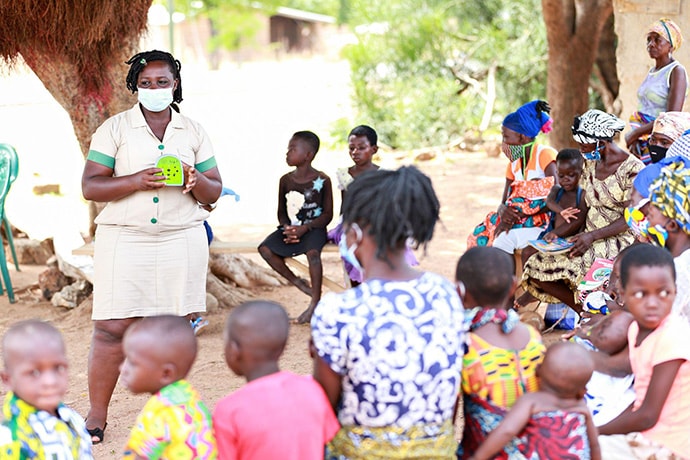
Photo credit: UNICEF Ghana. Community health nurses played Talking Book messages during ANC and child wellness clinics.
In April 2020, when Ghana Health Service and UNICEF partnered with Amplio to launch a rapid COVID-19 response campaign in the Upper West Region, the initiative made the news. UNICEF provided the loan of their Talking Book devices. Our Ghana team worked with health experts and local leaders to produce content about COVID-19 symptoms, treatment, and safety, as well as meningitis information due to an outbreak in the region. Messages were recorded in local languages and loaded onto Talking Books, which the team distributed to 207 Community-based Health Planning and Services (CHPS) compounds and five community health volunteers (CHVs) per district. The project reached over 200,000 people.
From April to December, CHPS nurses and CHVs played Talking Book messages during antenatal care and child wellness clinics and household visits. Because the device has a built-in speaker, families and groups of about 20 people can listen and learn together. The speaker function helped to support social distancing. The team also distributed PPE and sanitized the device between uses. To reach more people, they attached battery-powered outdoor speakers to Talking Books and broadcasted health messages at the markets and lorry stations.
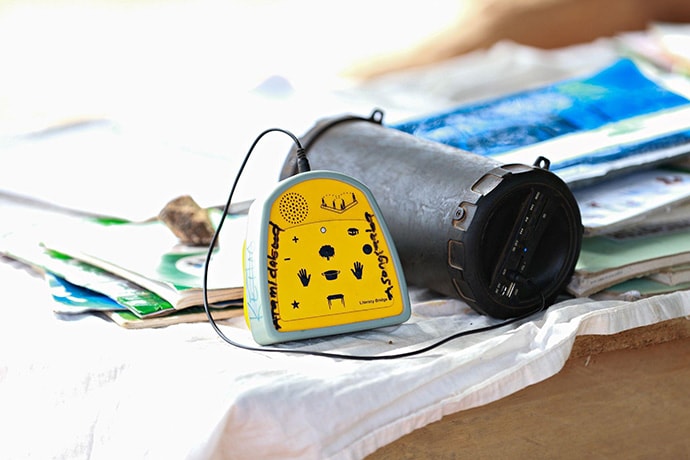
Photo credit: UNICEF Ghana. Although the Talking Book’s built-in speaker works for groups about 20, the team also attached battery-powered speakers for larger audiences, social distancing.
At the project midpoint, Talking Book usage data revealed that the district endorsement messages were the most played. Community health workers explained that people were scared and unsure about what to do. Endorsements recorded by faith leaders, traditional leaders, and health leaders helped build trust and combat misinformation. Through a household survey, the team identified emerging issues. In response, they added new messages about COVID-19 stigma, mental health, and domestic violence. Through monitoring, the team recognized a strain on Ghana Health Services. Rural districts normally see a high turnover of community health workers. However, turnover was even higher due to COVID-19. To build capacity for health education, the team ran Talking Book refresher trainings.
When the project ended in December, district health directors asked to continue using Talking Books to support public health education. With Talking Books, health workers deliver messages more efficiently and effectively. The device helps overcome language barriers between nurses and parents. It provides education and entertainment while clients wait. The use of Talking Book as an aid also helped revitalize the CHV support role, with more people willing to listen.
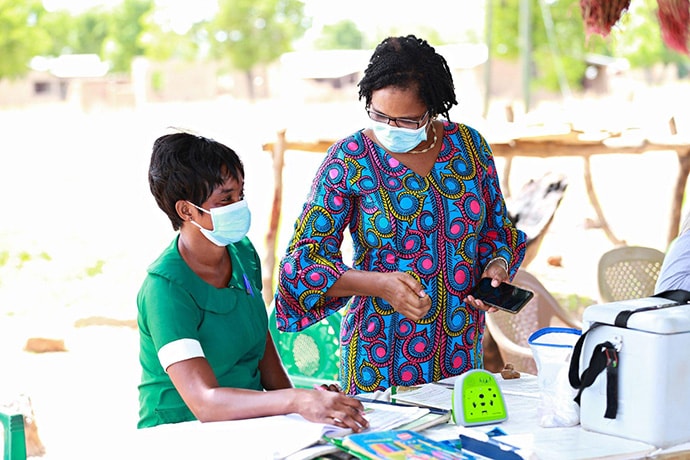
Photo credit: UNICEF Ghana. Georgina Amidu, Communication for Development Officer, UNICEF consults with a nurse.
“The Talking Book is context specific. It is made to suit the community. It’s in language that the community members understand,” said Phoebe Balagumyetime, District Health Director, Nadowli/Kaleo District.
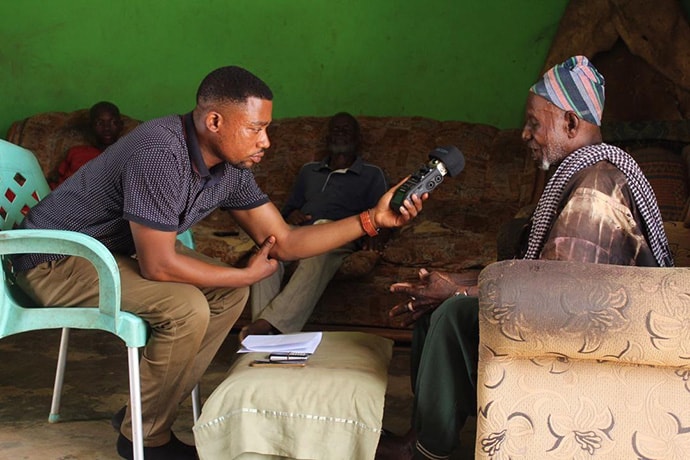
Photo credit: Amplio. Toffic Dapilaah, MEAL/Partnership Development Officer, Amplio Ghana, records an endorsement message from a traditional leader.
“What we’d like to do is to affect behavior change without a health crisis,” Morris said. “We’d like to take the wealth of knowledge about how to prevent disease, how to prevent injury, and bring that to people in a way that persuades them to do things that are more likely to bring them a safer, healthier, more productive life.”
Balagumyetime agrees.
“We’re looking at issues of malaria. People still do not believe that malaria can cause a lot of deaths and children die every minute. (We’re) talking about tuberculosis, polio. I mean, we thought we were done with polio.”
Through a partnership with Ghana Health Service and UNICEF, community health workers in Jirapa District are using Talking Books to promote health education and key family practices. The project is expanding two more districts, Lambussie/Karni and Daffiama/Busie/Issa-DBI.
The Amplio Talking Book is included in the COVID-19 Map & Match project’s Ghana Brief as a digital tool that can be leveraged and adapted for learning and training, risk communication, and community engagement.
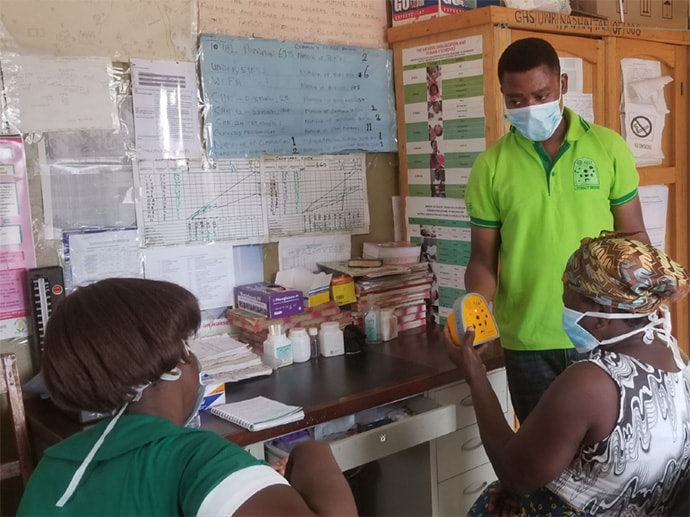
Photo credit: Amplio. Technology training for nurses.
The Talking Book has helped other programs continue their work during COVID.
- In Liberia, Landesa is using Talking Book to educate women farmers and youth about their constitutional land rights. The Talking Book help them maintain social distancing and share complex information. People are excited to hear the Talking Book speak their language. “After a training, young people were surprised to see a 90-year-old woman easily operate the device.” – Constance Teague, Land Tenure Specialist, Landesa
- VSO Zambia’s Adolescent TALK II project used Talking Book to educate and engage young people about sexual and reproductive health and rights during COVID-19. VSO volunteers said the technology provided youth with knowledge and a sense of purpose. Talking Books made it easier to share sensitive information and helped break down existing taboos about sexual health topic, making it easier for parents to talk to kids.
To learn how Landesa and VSO are leveraging Talking Books for land rights and adolescent sexual health education during the pandemic, see:
- Evaluating VSO Zambia’s TALK II project and impact on adolescent sexual health (blog)
- Let’s Talk! Innovation for Adolescent Sexual Health Education in Rural Zambia (webinar recording)
- Spreading the Word on Land Rights in Liberia (blog post)
- Spreading the Word: Landesa and Amplio leverage technology for legal empowerment (webinar recording)